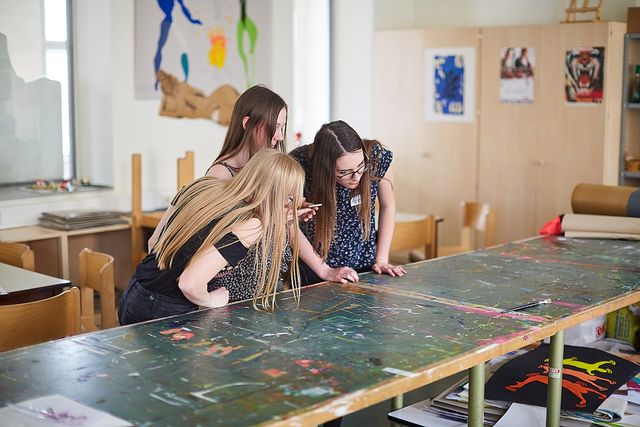Sound and Silence
HLW Krems with Veronika Großberger and Jorge Sanchèz-Chiong

What does school sound like? And will the school of tomorrow sound different? Students embarked on an acoustic journey of discovery, exploring the noises and sounds around the school and in the audio space of the Minoritenkirche in Krems. Using what they have heard as their starting material, the students compiled a sound map of the school which visually depicts the different audio qualities of the rooms. Using recording devices they collected sounds which were integrated into an audio trail installation—from school bells to echo sounds or playground noise. Using the pool of sounds anyone can compose their own school bell sound on the computer.
The HLW Krems is a Federal Higher Education Institute for fashion and economic professions. Thanks to its specialist theoretical and practical teaching it prepares students for a range of professions in the fields of economics, administration, tourism, nutrition, and fashion—without early specialization.
Veronika Großberger studied music and theatre studies in Vienna and cultural management in London. She was a scholarship holder of the Kölber Foundation (Masterclass on Music Education) from 2010-2012. Since 2013 she has worked as a music educator, designing projects for, amongst others, the Cologne Philharmonic Orchestra, the Tonspuren Festival in Irsee, and the Klangspuren Schwaz. She directs workshops in the school context which include cooperations with composers on musical and interdisciplinary themes. www.musikalischewunderkammer.com
Jorge Sánchez-Chiong has lived in Vienna since 1988 as a freelance artist. He studied composition under Francis Burt and Michael Jarrell at the University of Music and Performing Arts, Vienna. In 2015 he was a guest professor at the Institute for Computer Music and Sound Technology of the Zurich University of the Arts, and in 2016, for the fourth time, was a teacher at the International Summer Course for New Music Darmstadt. He has received commissions from the most important festivals for new music for a number of years, including Wien Modern and the Berliner Konzerthaus.
Supported by KulturKontakt Austria